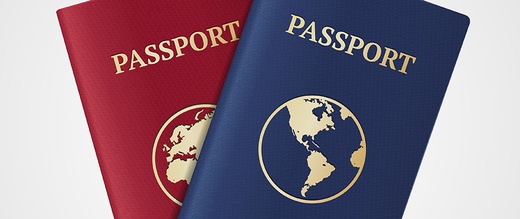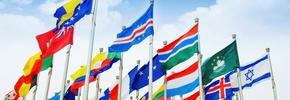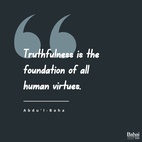The views expressed in our content reflect individual perspectives and do not represent the official views of the Baha'i Faith.
Travel ye to the East and to the West of the world and summon the people to the Kingdom of God. Hence the mercy of God must encompass all humanity. – Abdu’l-Baha, Tablets of the Divine Plan, p. 31.
If you consider yourself a world citizen, wouldn’t you like to have a world passport, that would allow you to travel anywhere in the world?
After all, the Universal Declaration of Human Rights says you should be able to have one:
Everyone has the right to leave any country, including his own, and to return to his country. – Article 13, Section 2, UDHR.
So let me tell you the fascinating story of the first world passport, and how it came about. Just as the Universal Declaration of Human Rights was initially implemented in 1948, a man named Garry Davis, sick at heart over his own role as a B-17 bomber pilot in World War II, renounced his American citizenship in Paris so he could become, in his words, “a citizen of the world.” In his memoir, Davis wrote:
Ever since my first mission over Brandenburg, I had felt pangs of conscience. How many bombs had I dropped? How many men, women and children had I murdered? Wasn’t there another way, I kept asking myself.
Supported in his unusual action by writers and intellectuals like Albert Camus, André Gide, Jean-Paul Sartre and Eleanor Roosevelt, Davis received worldwide acclaim and support, including this telegram from Albert Einstein:
I am eager to express to the young war veteran Davis my recognition of the sacrifice he has made for the well-being of humanity, in voluntarily giving up his citizenship-rights. He has made out of himself a “displaced person” in order to fight for the natural rights of those who are the mute evidence of the low moral level of our time. The worst kind of slavery which burdens the people of our time is the militarization of the people, but this militarization results from the fear of new mass-destruction in threatening world war. The well-intentioned effort to master this situation by the creation of the United Nations had shown itself to be regrettably insufficient. A supra-national institution must have enough powers and independence if it shall be able to solve the problems of international security. Neither can one nor has one the right to leave the taking of such a decisive step entirely to the initiative of the governments. – Einstein on Peace, p. 704.
Garry Davis then set up the World Service Authority in 1954, registering almost a million people as fellow world citizens. He gave away thousands of his passports to people in refugee camps, and he traveled the world as an advocate for peace and global citizenship until he passed away in 2013. The WSA still exists, and issues what it calls a World Passport, printed in seven languages including Esperanto. You can declare yourself a citizen of the world, and get a world passport at the WSA website.
However—I wouldn’t recommend you give up your current national citizenship, or attempt to use your new World Passport while traveling everywhere. Garry Davis himself tried to, and because many immigration officials wouldn’t accept his document, went to jail in thirty countries as a result.
Instead, wouldn’t it be terrific if a legitimate international government existed, and could issue a true world passport, recognized and accepted everywhere? Wouldn’t it be great if everyone could travel everywhere?
Think for a minute about what that could potentially accomplish. With everyone free to travel anywhere, we would begin to break down the barriers between peoples and nations. Rather than seeming like foreigners, we would soon become friends. The global connections unrestricted travel could build might eventually help avert the next terrorist incident or regional conflict. The freedom to travel across a planet with open borders, as a global citizen with a true world passport, could represent a major step on the path to a more encompassing, connected and friendly world, and help pave the way to world unity.
Then, on top of those considerable benefits, give this amazing data some thought: a meta-analysis of multiple research studies by economist Michael Clemens at the Center for Global Development produced an estimate that open borders would result in an increase in the Gross World Product (GWP) of between 67-147%–with a startling median estimate of a doubling of global GWP. If we would only open our borders to people like we have opened them to free trade, in other words, we could increase the world’s total economic prosperity by a hundred percent. Unrestricted movement of people across borders would make us all much more prosperous.
The Baha’i teachings call this natural human prerogative—the free and inalienable right to travel, to visit other places and meet other people—a cause of the spiritual education and progress of the soul:
The human spirit is a divine trust which must traverse every degree, for traversing and passing through the degrees of existence is the means of it acquiring perfections. So, for example, when a man travels in an orderly and methodical manner through many different countries and regions, this will most certainly be the means of acquiring perfections, for he will see at first hand various sites, scenes and regions; learn about the affairs and circumstances of other nations; become familiar with the geography of other lands; acquaint himself with their arts and wonders; become informed of the customs, conduct and character of their inhabitants; witness the civilization and the advancements of the time; and be apprised of the manner of government, the capacity, and the receptivity of each country. In the same way, when the human spirit traverses the degrees of existence and attains each degree and station—even that of the body—it will assuredly acquire perfections. – Abdu’l-Baha, Some Answered Questions, newly revised edition, p. 231.

















Comments
Sign in or create an account
Continue with Facebookor